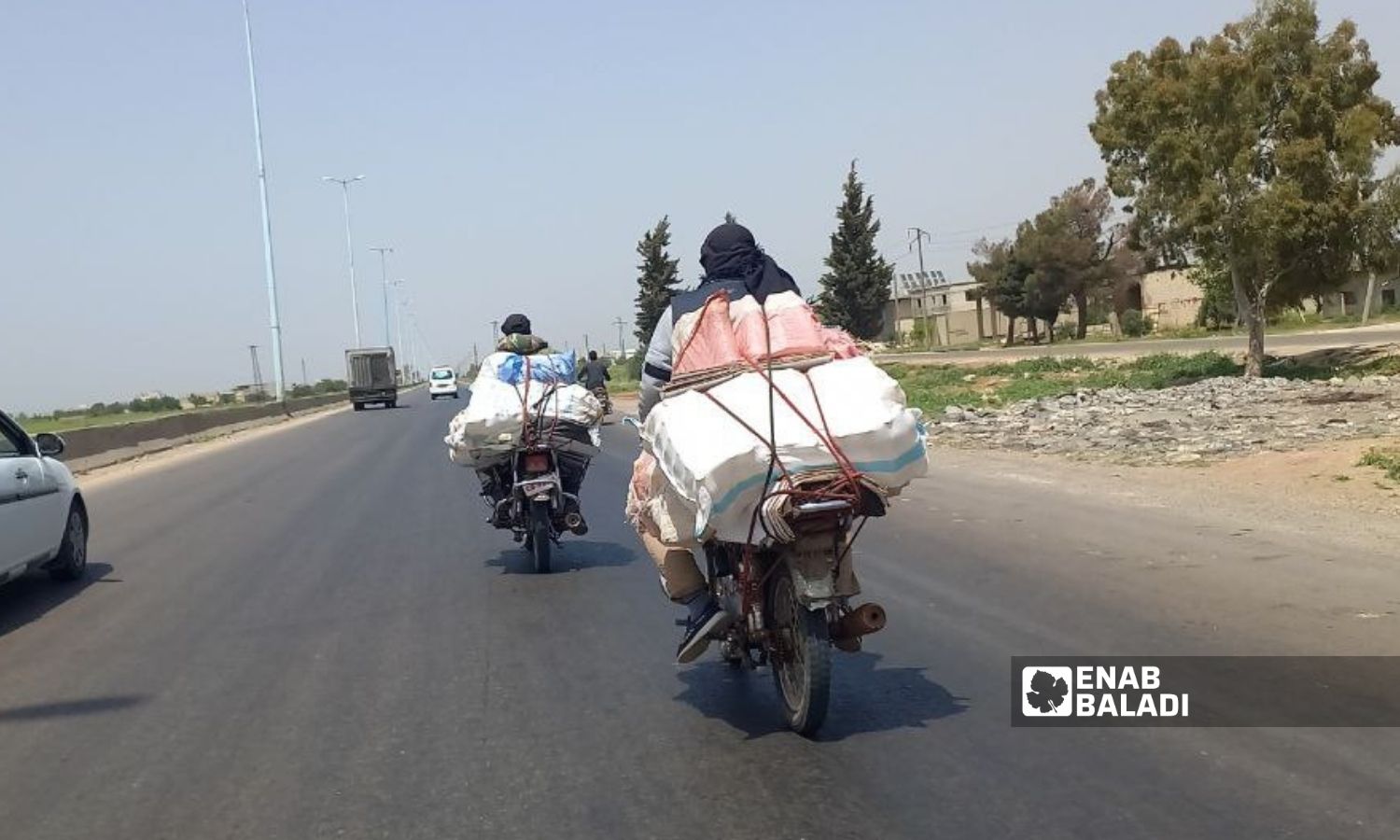



Homs – Orwah al-Mundhir
Nine years ago, the Lebanese Hezbollah militia took control of al-Qusayr, and since then, the border city with Lebanon has become the largest artery of the shadow economy that funds pro-regime forces on both sides of the borderline.
Organized smuggling operations, which are directly supervised by Hezbollah commanders, are active in partnership with officers from the army’s Fourth Division’s security office, according to local witnesses and smugglers that Enab Baladi spoke to.
Despite the control of factions affiliated with the regime forces backed by Hezbollah, the final word in al-Qusayr is still in the hands of Hezbollah’s leaders who hold Lebanese citizenship, who imposed their security control in the area through detachments and checkpoints that receive orders from Hezbollah’s leaders only.
Hezbollah and the Fourth Division prevented most of the area’s residents from returning to their homes, to be replaced by fighters loyal to the Iranian-backed Lebanese party of Hezbollah with their families, who were displaced from the villages of Kafraya and al- Foua in Idlib governorate in mid-2018.
The regime forces took control of al-Qusayr with military support from Hezbollah in June of 2013, after a major attack in which the regime forces and the party’s militia used all kinds of weapons, in addition to intensive aerial bombardment, which initially prompted the displacement of civilians sporadically.
This was followed by a forced displacement, which was the largest during the second military campaign in May of the same year, as thousands of the city’s residents fled to northern Syria, and a number of them sought refuge in the nearby Lebanese town of Arsal.
Over the past years, Hezbollah has turned al-Qusayr into its main base and a starting point for its military operations, which expanded to the rest of the Syrian regions, especially those on the border strip with Lebanon.
Local smugglers share the ‘running’ sectors among themselves, while the major smugglers pay bribes and royalties to Hezbollah officials and the Fourth Division’s security office on a monthly basis in exchange for allowing them to smuggle their goods from Lebanon to Syria and to ensure that their warehouses are protected from customs and supply patrols.
The al-Qusayr-based Saleh (who spoke on condition of anonymity for security reasons) told Enab Baladi that smuggling is divided in an organized way between those close to the Lebanese leaders and officers of the Fourth Division, as the sums are paid on a monthly basis to the representative of the Hezbollah’s financial office in the security square in al-Qusayr city.
“The office, in turn, hands over to the Fourth Division security office its share of the royalties,” he added.
The smuggling “auctions” are held on a monthly basis to receive the running line for each material, and after paying the required amount, the party leadership circulates at its checkpoints and the checkpoints of the army’s Fourth Division not to be exposed to the smuggler until the end of the contract term, according to Saleh.
“Merchants” share smuggling lines, such as fuel, foodstuffs, canned goods, grains, and electronic devices, and confiscate any smuggled materials not agreed upon for each smuggler.
The security barriers of Hezbollah and the Fourth Division secure the smugglers’ warehouses from any raid by the customs police in the area or state supply patrols in their areas of control.
In their turn, traders depend on a complex network of smugglers via motorcycles to transfer goods to local markets in other cities and governorates, relying on a number of sub-roads to reach the international highway or relying on the Fourth Division’s military vehicles.
One of the locals who uses a motorbike in smuggling (Enab Baladi withheld his name for security reasons) said big quantities of smuggled goods are carried out only by Fourth Division vehicles to merchants affiliated with the division.
But small merchants, who work outside the Fourth Division grip, are relying on motorcycles to transport their goods to avoid customs patrols that are scattered along the road, as motorcycles are able to maneuver on rough side roads, which are impossible for customs patrols to use, he added.
Generally, customs patrols do not stop motorcycles when passing near them, as they know that the smuggler will not stop and will take roads that customs cars cannot take, or motorbikes will walk in the opposite direction on the highways, according to the smuggler.
A large number of local young men depend on working with smuggling networks because of the sums they receive in return for transporting goods from al-Qusayr region to Homs and Hama city centers.
A motorcyclist from Hama city, who refused to reveal his name for security reasons, told Enab Baladi that the motorcyclist takes 25,000 Syrian pounds (about 5 USD) for riding a loaded bike from al-Qusayr to Hama, which is a large sum for a trip that does not exceed four hours.
The Syrian regime forces, backed by Hezbollah forces, took control of the city nine years ago. For the first time, foreign forces participated in battles with the regime forces, which resulted in the destruction of 85 percent of the buildings, and the displacement of its entire residents.
Al-Qusayr is one of the large cities in Homs governorate, and it has more than 80 villages, most of which are of the Sunni sect, as well as villages of Christian, Shiite, and Alawite sects. The area’s population is about 111,969, according to the 2011 census.
if you think the article contain wrong information or you have additional details Send Correction